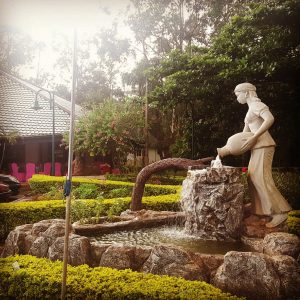Yesterday I took the bus from Yaoundé to Bertoua. I was accompanied by my good friend Oumarou – who has been an absolutely exceptional host while I was in Yaoundé. We were also accompanied by another Mbororo (Adama) who is finishing his PhD in Netherlands on legal anthropology. His topic is fascinating – as he examines the legal intersection between refugee and nomad, with reference to Mbororo pastoralists escaping the war in CAR.
As we left Yaoundé, there was a lot of construction going on. There seemed to be an artificial dam and a lot of large construction plots (below). This is typical of a lot of urban African areas, with funding coming from all sorts of sources (World Bank, state governments, Chinese, etc.).

A bit further along, there was a stretch of road with a lot of different universities.
The route was beautiful. It was forested and cool for much of the journey. The road was just two-lanes, and smooth and well-paved throughout. There were about ten check-points through the journey, with two that required all passengers to vacate the bus and give full documentation.
Throughout the journey there were small villages and communities along the side of the road. They live in red brick/mud houses. These were tiny communities of just a few houses. It was much less congested than Yaoundé, and the air was crisp and clean. It seemed the quality of life was so much better in these rural areas – everybody has homes, they grow their own crops, they are more relaxed. It seems that the congestion of the city has resulted both from people’s choices to migrate there, but also ideas that cities provide some sort of opportunity. I think the burden is that cities like Yaoundé become over-crowded, and most people end up selling things on the street. In these rural areas, there seems to be more freedom and autonomy, and less desperation.
There was green everywhere, and so much open space. I was amazed at how lovely the forests were. It is said that Africa is poor, but as many experts have pointed out – there is plenty of land, resources, minerals, and human capital.
The road was almost empty for much of the journey. It seemed every vehicle was either a lorry carrying vegetables or fruit (usually onions, pineapples, bananas) or wood, or another bus. There were lorries driving all day from the East back to Yaoundé or Douala with only a few huge logs. I didn’t recognize the tree, but it must have been very valuable to spend all day driving just a few huge logs. I later asked Oumarou – and he said it would be sent to Douala and even Europe.
We arrived around six in the evening as dusk began to settle. We were met by a different Oumarou, and had dinner at their house. We sat on the ground in the proper Muslim/Mbororo way. They thought it was funny how much I struggled to sit properly, so they took lots of photos (below). The man’s house was very nice, as was the food. They left me for about fifteen minutes for their evening prayer at mosque. Following dinner, they drove me to Mandjou, a village outside Bertoua, where I will be staying for the remainder of my time in Cameroon.

Everybody has been wonderful and friendly, and I am ready to get started learning more about the situation of Mbororo in the East region.








